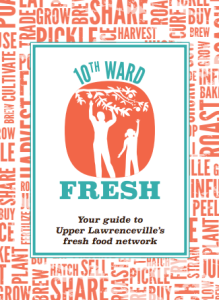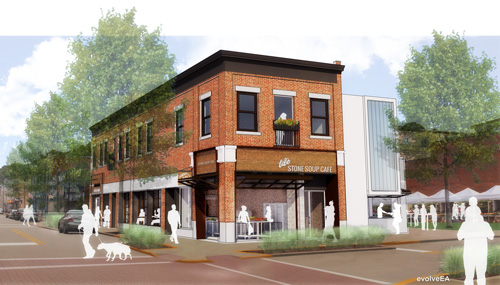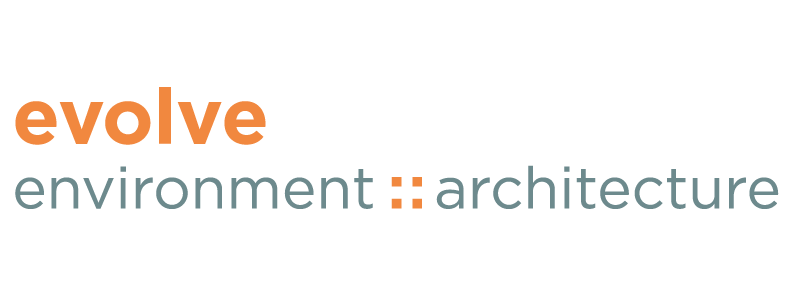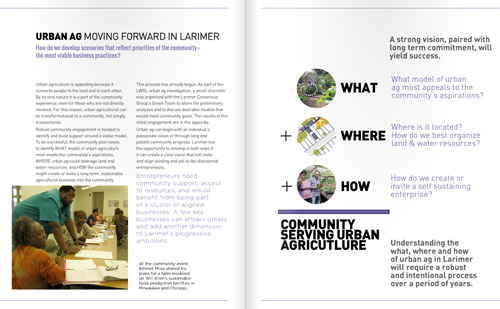Cultivating Community
In light of the buzz surrounding Pittsburgh’s food scene, we have been thinking about the role of food in creating vibrant and resilient communities across our city. The 2015 Pittsburgh Food Policy Council Annual Report notes: “Pittsburgh simultaneously tops lists for most livable city and best food town, as well as the food insecurity lists for cities of similar size. Nearly half of Pittsburghers live in communities that meet criteria for food deserts.” In many of the projects we’ve worked on, food is used to not only to sustain and nurture us but to bring communities together. At its core, the sustainability movement is a drive to provide everyone with basic sustenance – food, water, energy and shelter.
In Upper Lawrenceville’s Community Visioning project we hosted community meetings to hear from neighbors about areas that needed improvement and the goals and ideas they had for driving positive change. Co-owner of the now well-established 52nd Street Market, Dierdre Kane stated:
“One of the main concerns that were addressed at the meetings was the lack of fresh produce and grocery options. Also there was a sense of wanting a walkable neighborhood where folks could live, work and play. The result of the meetings was the 10th Ward Plan”.
The visioning process inspired residents to build a neighborhood fresh food network to address gaps in their local food system. The 52nd Street Market, which sometimes sells produce grown by the Lawrenceville Organic Community Garden, was one of the first new food-based businesses to open after the completion of the visioning process.
 Our engagement with the Upper Lawrenceville community, also known as the 10th Ward, continued to center on access to fresh food and the power of the neighborhood food economy with the 10th Ward Fresh campaign. We designed a pamphlet/poster and campaign to promote the neighborhood’s existing fresh food businesses, gardens, cooperatives and other destinations as well as to inspire food entrepreneurs, urban farmers, gardeners and volunteers to launch new ventures, highlighting the network of local resources at their disposal. This is attracting investment from private and public entities who recognize the neighborhood’s potential as a growing fresh food economic center.
Our engagement with the Upper Lawrenceville community, also known as the 10th Ward, continued to center on access to fresh food and the power of the neighborhood food economy with the 10th Ward Fresh campaign. We designed a pamphlet/poster and campaign to promote the neighborhood’s existing fresh food businesses, gardens, cooperatives and other destinations as well as to inspire food entrepreneurs, urban farmers, gardeners and volunteers to launch new ventures, highlighting the network of local resources at their disposal. This is attracting investment from private and public entities who recognize the neighborhood’s potential as a growing fresh food economic center.
As you may have heard, we have been helping the Millvale Community Development Corporation (MCDC) and Borough of Millvale reimagine itself and transform from a food desert to a foodie hub known for hyper-local production. A once abandoned building that’s now owned by MCDC will house a cafe as well as offices upstairs for entrepreneurs. Additionally, MCDC’s Gardens of Millvale has been working hard at turning Millvale into a leader in urban farming, with hopes of providing food for up to 95% of the food needs of Millvale’s restaurant cluster. Millvale is demonstrating how the community’s voice and action can provide solutions to the problem of food deserts.

evolve’s design for the Millvale Food Hub
In Larimer, where we worked with the community to plan Pittsburgh’s first Ecodistrict, years of dedication by residents is now reinforced by substantial investment in new, green infrastructure and real estate development. Building partnerships among grassroots initiatives, developers and public agencies is producing exciting results. Urban agriculture has a long history in Larimer, from carp ponds to backyard gardens that fed families. The community has come together to write the next chapter for growth. Our more recent involvement with Living Waters of Larimer (LWOL) addressed food-related goals by assessing the community’s urban agriculture progress and potential for expansion and connection to new rainwater infrastructure. Apples On The Avenue, the LWOL Urban Ag Report, is intended to help advance Larimer’s ongoing efforts to create a community-focused model for urban agriculture.
Organizations and businesses have collaborated with us to create places and systems for food consumption, production and distribution at a range of scales. Here are a few examples:
- Commonplace Voluto Coffeeshop
On our section of Penn Avenue, Commonplace Voluto serves as a community meeting place that has provided food options through partnerships with local food trucks, bakeries and the organization Community Kitchen Pittsburgh. evolveEA designed the interior when Voluto opened in 2009, and we continue to enjoy having one-on-one meetings, work sessions and coffee breaks there, and also held an exhibition in the space. - Greater Pittsburgh Community Food Bank
Our relationship with the important regional food security organization has included strategic planning, architectural design and helping with the design and construction of one of the first 10 LEED certified buildings in the United States. Each engagement contributes to the Food Bank’s goal to deliver more food to more people. - Grow Pittsburgh Offices and Rooftop Greenhouse Study
Another organization driving regional fresh food production, Grow Pittsburgh’s mission is to teach people how to grow food and promote the benefits gardens bring to our neighborhoods. Not only have we crossed paths working with some of the same communities, we’ve been able to support Grow Pittsburgh’s work by helping with the design of their offices and a feasibility study on the potential for rooftop greenhouse food production in Pittsburgh.
These projects have used community engagement and design to improve our food system and create food-based places, but it is only the beginning. Design can encourage healthier eating habits, gardening, and, a personal favorite—cooking! Cooking is the missing link that is often overlooked or taken for granted. We spend lots of time and effort planning, prepping, and creating meals at home and understand that the ability to do this is linked to socio-economic privilege that many people are not afforded. In order to develop healthier and more sustainable communities, we don’t just need more access to fresh food, we also need strategies that will create the economic and social conditions necessary for everyone to eat well and live well. Achieving this level of equity should be the ultimate goal for the sustainability movement.


